This Fall, our student-run newspaper Gazeta published two successful issues online. Follow the link and enjoy reading!
This Fall, our student-run newspaper Gazeta published two successful issues online. Follow the link and enjoy reading!
On Oc tober 29, 2020, Rachel Faith ’14, who works as a translator for the World Intellectual Property Organization (UN) in Geneva, talked about how her expertise in Russian language and culture opened up for her an exciting career in the field of translation and patents. We had a large turnout at the talk and students were exited to ask questions and learn about Rachel’s exciting career path.
tober 29, 2020, Rachel Faith ’14, who works as a translator for the World Intellectual Property Organization (UN) in Geneva, talked about how her expertise in Russian language and culture opened up for her an exciting career in the field of translation and patents. We had a large turnout at the talk and students were exited to ask questions and learn about Rachel’s exciting career path.
On October 15th, as a part of the Tepper Speaker Series: Global Russia, Prof. Roman Utkin (Wesleyan University) gave a talk on “Queer Exile: Russian Emigres in Interwar Berlin and Paris.”
Prof. Utkin’s talk focused on configurations of queer subjectivity in interwar Europe’s Russian exilic communities in Berlin and Paris. In his talk, Dr. Utkin discussed the case of the Nabokov brothers, the well-known Vladimir and, in particular, his unknown brother Sergei, and analyzed how Sergei’s exilic gay experience can give us insight into understanding on how queer artists and intellectuals contented with the heteronormative world. 
The Russian and Post-Soviet Studies Program held its annual Tepper Speaker Series: Global Russia virtually this semester.
On September 17th, Prof. Douglas Rogers (Yale) gave a talk titled “How and Why to Make Oil into Food: A Tale of Soviet biotechnology and Human – Microbe Relations.” In his talk, Prof. Rogers focused on an interesting period in the history of Soviet science: the massive effort, from the early 1960s to the late 1980s, to transform oil into food through industrial scale fermentation, which was a part of a larger international science competition in a Cold War context.
To stick with tradition, Fall the semester kicked off with a student-run film series in early September. This semester’s theme was “Post-Soviet Portraits” and students together with faculty enjoyed watching and discussing Mongol: The Rise of Genghis Khan, Battle for Sevastopol, Legend No. 17, and A Bitter Taste of Freedom.
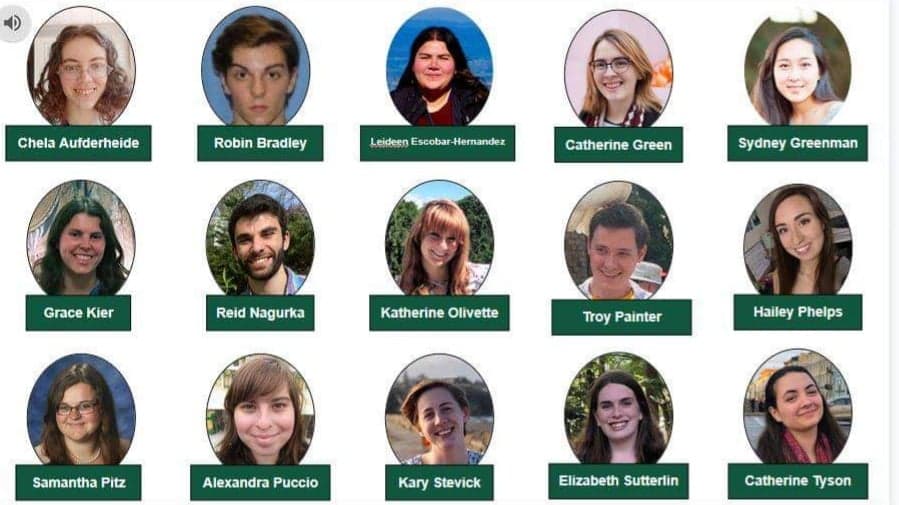
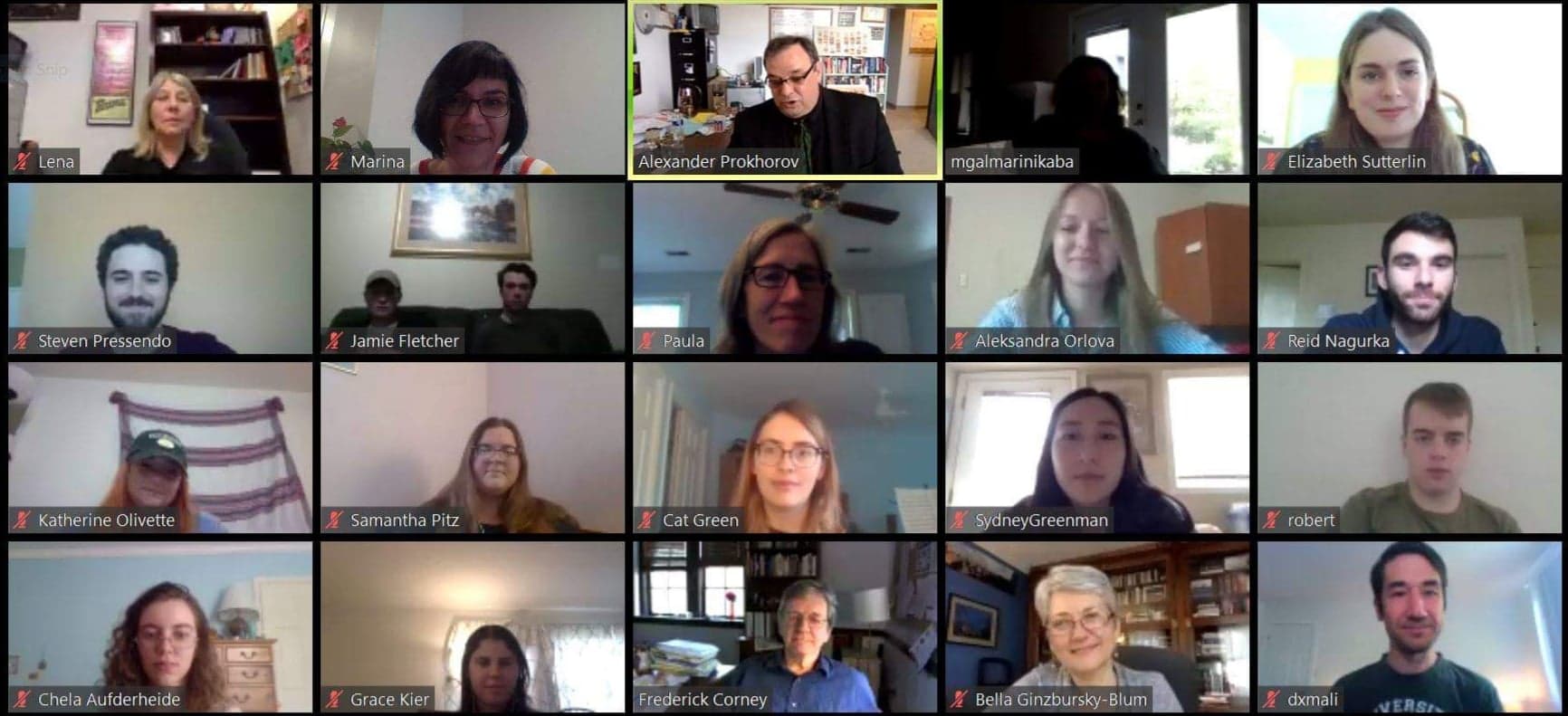
On April 17th, 2020 RPSS program held a Zoom reception to recognize graduating seniors and their accomplishments. Congratulations to the winners of the 2020 Russian and Post-Soviet Studies awards, Modern Language Excellence Award, ACTR Post-Secondary Russian Scholar Laureate Award—PSRSLA, and Fulbright Scholarships!
Robin Bradley — RPSS Excellence Award
Catherine Green — RPSS Excellence Award
Reid Nagurka — RPSS Excellence Award
Elizabeth Sutterlin — RPSS Excellence Award
Catherine Tyson — Modern Language Excellence Award
Congratulations to Grace Kier on receiving ACTR Post-Secondary Russian Scholar Laureate Award—PSRSLA.
Congratulations to Arianna Afsari and Catherine Tyson for receiving prestigious Fulbright Scholarships.
We are very proud of you and are impressed with all your accomplishments! Моло дцы!
дцы!
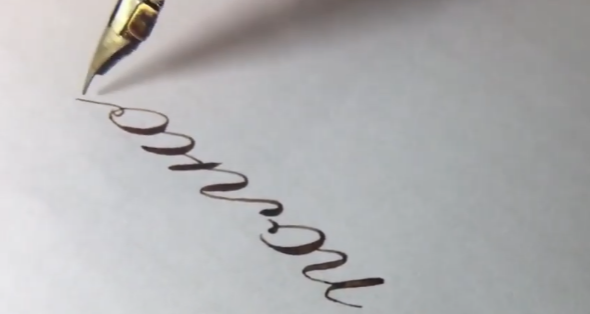
We ar e very proud to announce that the following students have been awarded with four Honorable Mentions of the of the Annual ACTR National Post-Secondary Russian Essay Contest!
e very proud to announce that the following students have been awarded with four Honorable Mentions of the of the Annual ACTR National Post-Secondary Russian Essay Contest!
The 2020 ACTR contest received 1261 essays submitted from 56 universities, colleges, and institutions across the nation.
Congratulations to our amazing four:
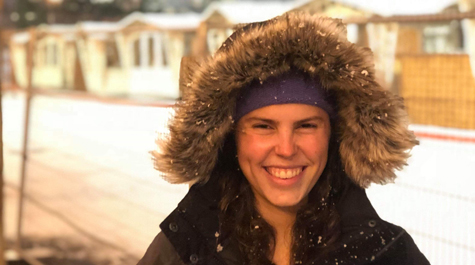
Grace Kier ’20 is among a select group of 12 students nationwide to receive a prestigious 2020-21 fellowship to the James C. Gaither Junior Fellows Program at the Carnegie Endowment for International Peace (CEIP). Congratulations, Grace! So well deserved!
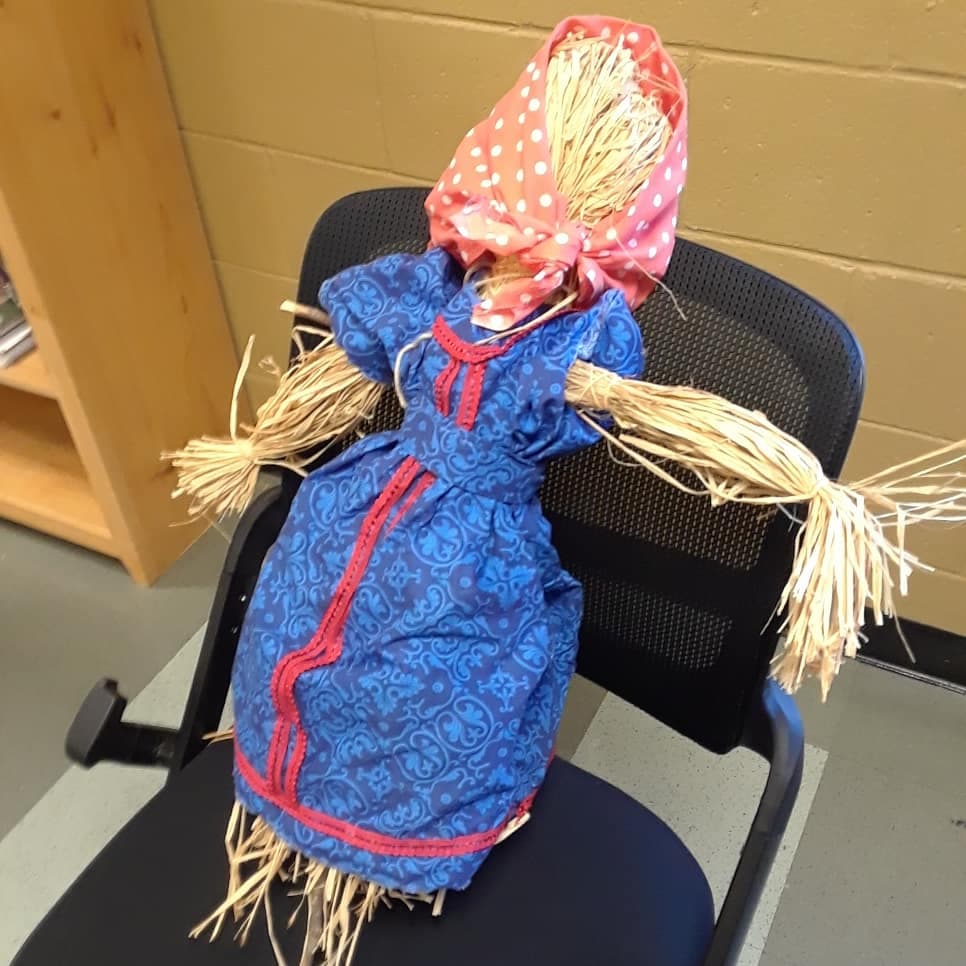
On February 29, Russian program gathered to celebrate Maslenitsa. In Russia, Maslenitsa, or the sun-festival, marks the end of winter and advent of spring. Maslenitsa is celebrated during the last week before the Lent, seven weeks prior to the Easter. In the Russian House, it’s a celebration of friendship and the spring semester. This year, in addition to enjoying delicious food (lots of bliny!), students played Kahoot based around Maslenitsa and forthcoming Russian Olympics.We had an amazing time, lot of fun and laughs!
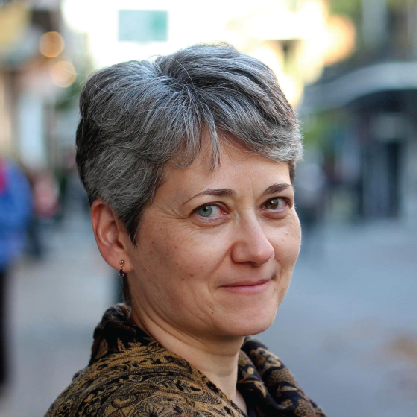
C ongratulations to Bella Ginzbursky-Blum, the recipient of 2020 National AATSEEL (American Association of Teachers of Slavic and East European Languages) Excellence in Teaching Award! Professor Ginzbursky-Blum is a Senior Lecturer in the Department of Modern Languages and Literatures. She teaches Russian language classes at all levels, and also enjoys teaching classes on Russian literature and, especially, on the Russian Fairy Tale Tradition.
ongratulations to Bella Ginzbursky-Blum, the recipient of 2020 National AATSEEL (American Association of Teachers of Slavic and East European Languages) Excellence in Teaching Award! Professor Ginzbursky-Blum is a Senior Lecturer in the Department of Modern Languages and Literatures. She teaches Russian language classes at all levels, and also enjoys teaching classes on Russian literature and, especially, on the Russian Fairy Tale Tradition.
So well deserved!
This  summer I traveled to Russia for six weeks on one of the W&M Summer Study Abroad programs. There were ten students and Professor Corney in our group, and we stayed in St. Petersburg for five weeks and Moscow for one week. While in St. Petersburg, we took Russian language courses at Herzen State Pedagogical University and a Russian history/culture class with Professor Corney. In Moscow we took Russian language classes at Moscow State University and went on field trips around the city with our teachers.
summer I traveled to Russia for six weeks on one of the W&M Summer Study Abroad programs. There were ten students and Professor Corney in our group, and we stayed in St. Petersburg for five weeks and Moscow for one week. While in St. Petersburg, we took Russian language courses at Herzen State Pedagogical University and a Russian history/culture class with Professor Corney. In Moscow we took Russian language classes at Moscow State University and went on field trips around the city with our teachers.
One of the highlights of the trip for me was my homestay in St. Petersburg. I stayed with a Russian couple in an apartment on Vasilevskiy Island. My room was gorgeous and had its own balcony overlooking the River Smolenk, from which I watched many sunrises, sunsets, and fireworks! My host mom Ekaterina was genuinely interested in helping me practice Russian, and she taught me new words each day. She also was an amazing cook; at every meal I had more food than I could possibly eat, and all of it was delicious. Ekaterina also gave me suggestions for places to go (monument parks, museums, a flower festival, etc.). I feel like living in a homestay gave me cultural opportunities that I never would have had otherwise.
One of my favorite things that we did as a group was go to the old building of the Mariinsky Theater to see the opera Boris Godunov. I’ll admit, when Professor Corney said that he had bought tickets for us to go to a four-hour historical opera all in Russian, there was a lot of skepticism in the group. However, we all left the opera talking about how much we loved it and how glad we were that we had gone!

One of my favorite things that I did independently was go to the Erarta Museum of Contemporary Art. They had many interesting displays of art by current Russian artists, several of which were interactive. It gave me an interesting insight into how Russians view their own country. The museum also had cartoons in Russian about Malevich’s Black Square coming to life and wreaking havoc, which I still watch on YouTube sometimes because they’re funny and perfect for practicing Russian!
Overall, I had an amazing time on my study abroad trip to Russia this summer. I highly recommend the trip to anyone who wants to learn more about Russian language, culture, or history!
Samantha Smith
 This past summer I studied abroad at Herzen State University in St. Petersburg with William and Mary. Our group studied in St. Petersburg for five weeks and traveled to Moscow for a week. At Herzen State we studied Russian language and history. Our history class, taught by Prof. Frederick Corney, focused on historical sites of memory from the Soviet Union. We had many interesting excursions around the city exploring the theme of historical memory in Russia.
This past summer I studied abroad at Herzen State University in St. Petersburg with William and Mary. Our group studied in St. Petersburg for five weeks and traveled to Moscow for a week. At Herzen State we studied Russian language and history. Our history class, taught by Prof. Frederick Corney, focused on historical sites of memory from the Soviet Union. We had many interesting excursions around the city exploring the theme of historical memory in Russia.
My favorite excursion was the visit to Peterhof Palace. Peterhof was built by Peter the Great in the early 18th century. The palace was almost completely destroyed during World War II but has since been reconstructed to its former glory.
When we first arrived at Peterhof we took a tour of the palace which featur ed gilded ball rooms and bedrooms. Although, it is a beautiful palace it is hard to imagine real people living there. The interior of Peterhof is impressive but the real showstopper of the palace is its fountains. All of the fountains work by gravity and the gardens feature a plethora of beautiful decorative and trick fountains.
ed gilded ball rooms and bedrooms. Although, it is a beautiful palace it is hard to imagine real people living there. The interior of Peterhof is impressive but the real showstopper of the palace is its fountains. All of the fountains work by gravity and the gardens feature a plethora of beautiful decorative and trick fountains.
After we walked through the gardens and saw the fountains, we saw the palace Peter the Great originally built at this location. This palace is known as Monplaisir palace and is much smaller and right on the banks of the Gulf of Finland. Monplaisir was my favorite palace we visited in Russia because it felt more like a real home than the other places we saw. If I were a Czar, I would live in Monplaisir. When it was time to leave Peterhof, we didn’t take the bus back but instead rode a hydrofoil on the Gulf of Finland. It was a really amazing chance to see Peterhof from the water. My day at Peterhof, like my time in Russia, was truly unforgettable!
Georgiana Reece
The Russian House (Pleasants Hall) hosted the RPSS Homecoming reception for alumni of the program. Former and current students, friends, majors and minors gathered to catch up and enjoy delicious Russian food. It was great to learn about all the exciting things you are doing and about your future plans. Stay in touch and visit us again at next year! It was so wonderful to see you all!
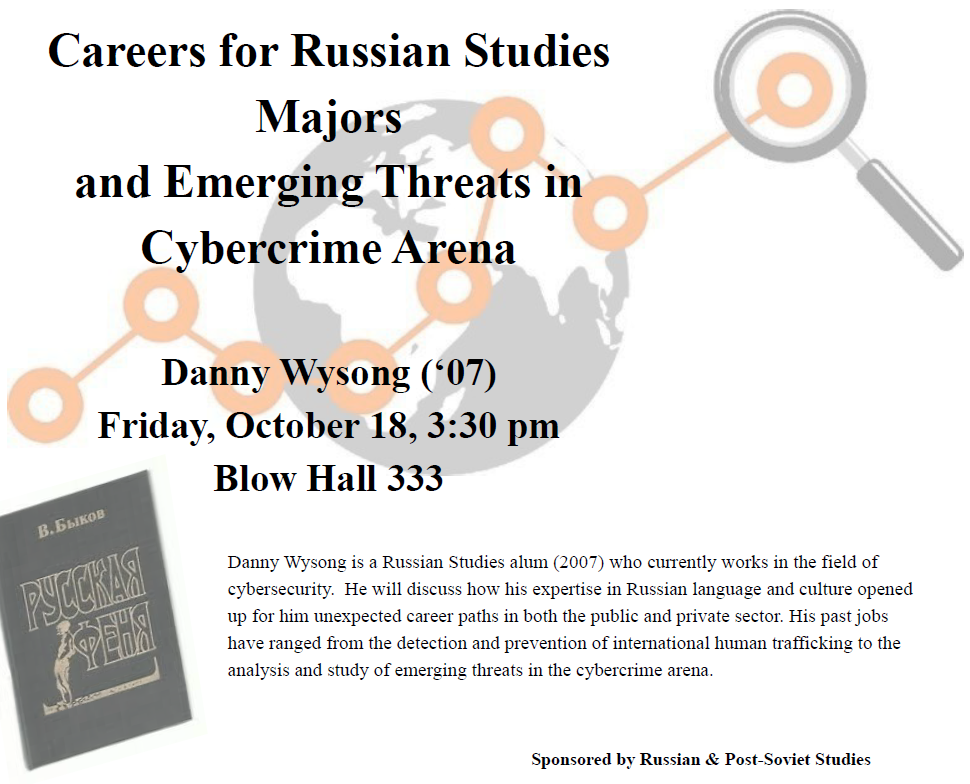
On October 18, 2019, Danny Wysong, Russian Studies alumnus (2007) talked about how his expertise in Russian language and culture opened up for him an exciting career in the field of cybersecurity. His past jobs in both the public and private sector have ranged from the detection and prevention of international human trafficking to the analysis and study of emerging threats in the cybercrime arena.
On Sep tember 19, 2019, Professor David Brandenberger from University of Richmond gave a talk entitled “Stalin’s Master Narrative” in which he discussed his book Stalin’s Master Narrative: A Critical Edition of the Short Course on the History of the Communist Party (Bolsheviks), co-edited with Mikhail Zelenov (New Haven: Yale University Press, 2019). Dr. Brandenberger talked about his 12-year extensive archival research that resulted in a thorough critical study of the Short Course. In Stalin’s time the book was considered to be the encyclopedia of Bolshevism and served as primer of party history both at home and throughout the communist world abroad. Prof. Brandenberger discussed the history of the Short Course, starting with the inception of the text in the twenties, Stalin’s rewriting of the original version, Khrushchev’s denouncement of the book, and the afterlife of the party catechism.
tember 19, 2019, Professor David Brandenberger from University of Richmond gave a talk entitled “Stalin’s Master Narrative” in which he discussed his book Stalin’s Master Narrative: A Critical Edition of the Short Course on the History of the Communist Party (Bolsheviks), co-edited with Mikhail Zelenov (New Haven: Yale University Press, 2019). Dr. Brandenberger talked about his 12-year extensive archival research that resulted in a thorough critical study of the Short Course. In Stalin’s time the book was considered to be the encyclopedia of Bolshevism and served as primer of party history both at home and throughout the communist world abroad. Prof. Brandenberger discussed the history of the Short Course, starting with the inception of the text in the twenties, Stalin’s rewriting of the original version, Khrushchev’s denouncement of the book, and the afterlife of the party catechism.